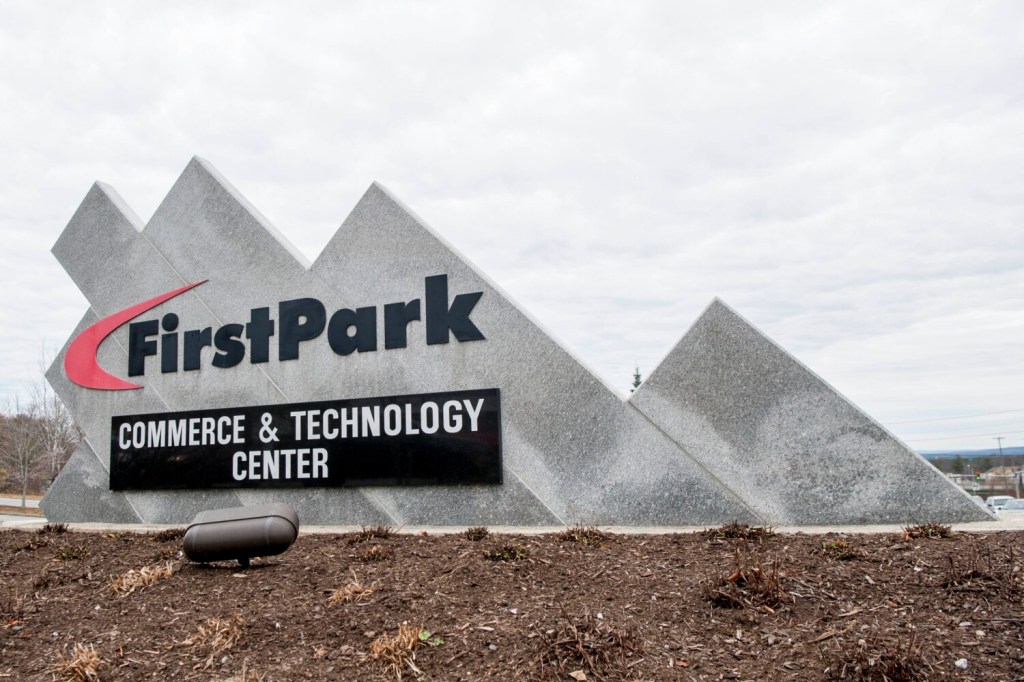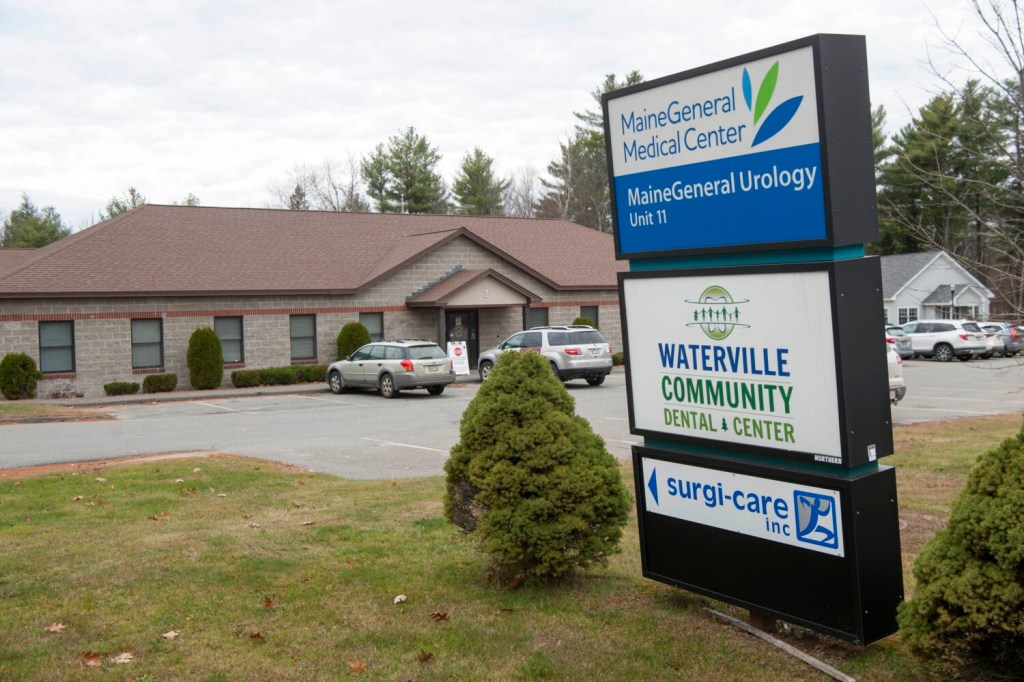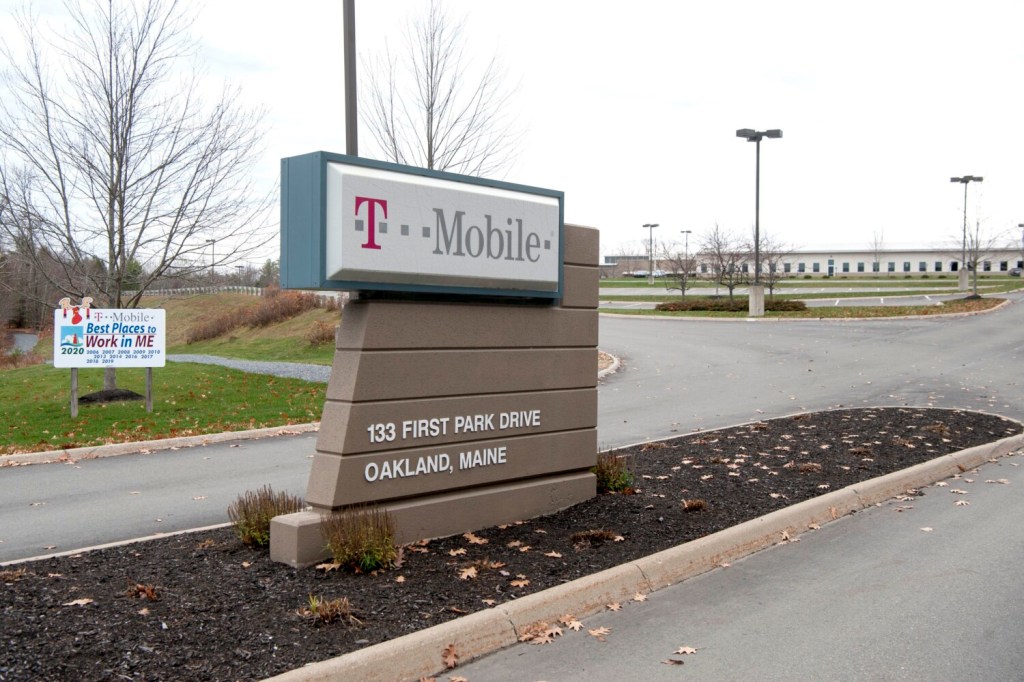OAKLAND — FirstPark has paid off its bond debt. Now, the commerce and technology center off Kennedy Memorial Drive in Oakland is working to deliver greater return on its member communities’ investments in the park by boosting tax revenues and selling more lots at the 285-acre campus.

Last week, the business park made its final bond payment to the Maine Municipal Bond Bank, wrapping up the 20-year loan the park and its 24 municipal members signed with the intention of gaining a source of tax revenue.
The leadership of the quasi-municipal park is brokering deals to sell the remaining lots, or perhaps the whole campus, although that could be unlikely because all 24 member communities would have to agree on the deal.
“We’ve retired the debt service. It’s good for us in that we can now have a conversation with how we allocate those funds going forward,” FirstPark Executive Director Jim Dinkle said.
“I’ve been here three years and that annual payment was due in the third week of October, so it’ll be nice in the third week of 2021 to have that off the books, so to speak.”
FirstPark, which is in a foreign trade zone off Exit 127 of Interstate 95, has hired SVN | The Urbanek Group of Portland as the commercial and industrial real estate broker to sell the remaining lots, which run $15,000 per acre.
When FirstPark lots are sold, they are subject to terms of a restrictive covenant, and their owners pay an annual assessment of $500 per lot to the authority.
T-Mobile is FirstPark’s largest tenant, employing about 800, officials said.
Bioenergetic Healing, Gateway Financial Partners, Northern Light Podiatry, L.L.Bean, MaineGeneral, Maine Medical Partners, Maine Eye Doctors, One River CPAs, Waterville Community Dental Center and SurgiCare also own space at the park, which employs more than 1,000.
L.L.Bean owns lots 2 and 3. It has never developed them, however, and seeks to sell them. Lot 4 is also for sale.
Dinkle said a data center and food processor would be good fits for FirstPark, which is being marketed locally and nationally.
When discussing FirstPark with companies, officials emphasize the foreign trade zone, high-speed fiber-optic internet and comprehensive building requirements. Resources for employees are available at local schools, such as Colby, Thomas and Kennebec Valley Community colleges.
“The strong elevator pitch has to be the available, skilled workforce we have within the region,” Dinkle said. “There’s good workforce development training programs offered across central Maine.”
The final bond payment of $256,722.80 marked the end of the loan, created in 1998. The full bond principle was for $3 million, with a 20-year payment plan. But it was refinanced in 2010 at a better rate. With interest, the total cost was close to $5 million, according to officials.
“What will be happening the next probably four-to-six months is we will be developing a budget for next year, which that budget begins at the first of July in 2021,” said Steve Monsulick, FirstPark’s president and representative from Readfield. “There will be a discussion, basically, about where we go from here and how we go from here.”
The 24 municipalities behind FirstPark are Anson, Benton, Canaan, China, Clinton, Cornville, Fairfield, Farmingdale, Gardiner, Hartland, Manchester, Norridgewock, Oakland, Palmyra, Pittsfield, Readfield, Rome, Sidney, Smithfield, Solon, Starks, St. Albans, Waterville and Winslow. Through legislation in 1998, they joined together to establish the park as the Kennebec Regional Development Authority, or KRDA.
Fairfield Town Manager Michelle Flewelling serves on the FirstPark executive board and chairs the Design Review Committee. She was working in the town of Clinton when the authority was created. She has also worked in Norridgewock.
“It’s important to remember that the bond paid for the existing infrastructure, but that park is not built out to its capacity, so there’s still potential for expansion of utilities and roads and other lots,” Flewelling said. “Paying off the bond is a very positive step forward, which means we’ve met a goal.”
Directors and officers of the authority are volunteers. James Jurdak, treasurer of FirstPark, has represented Oakland since the governing body was established in 1999. Each municipality is assured at least one seat for a representative on the authority board. Each community chooses how its representative is selected and is encouraged to designate an alternate who can vote if that representative is absent.
Oakland collects the tax revenue from FirstPark, and Jurdak distributes the revenue evenly to the authority’s 24 member communities. For the past three fiscal years, Jurdak said, FirstPark has returned to member communities 60% of their annual assessment because they are still providing funds to support the authority.
“Our goal is to get closer and closer to 100%, and ultimately return prior funds from prior years. We aren’t there yet,” Jurdak said. “We need to generate taxable property and we need to generate lot sales. Those are the forms of revenue that are distributed back into the 24 member communities.”
Oakland Town Manager Gary Bowman said FirstPark is important to his community, including the revenue it generates.
“They’ve been great to work with,” Bowman said. “It’s no burden on the town of Oakland whatsoever, and it’s certainly an advantage to have it here.”
FirstPark officials say they are looking for ways to market the park and further reduce its cost to member communities.
“At this point in time, we have obviously reduced our financial obligations to outside entities by $250,000-plus per year, so there will be an impact, but I can’t comment on exactly how that’s going to play out,” Monsulick said. “We want to continue to prioritize the marketing side, if at all possible, as we develop our budgets.”
In the past, communities worried about the investment. According to a 2014 Morning Sentinel story, cities and towns had lost more than $5 million.
A 1998 study by New Hampshire-based RKG Associates pegged positive yearly returns to occur beginning in 2004 and the entire investment to be repaid by 2007.
In 2014, Waterville City Manager Michael Roy said he thought the Sept. 11, 2001, terrorist attacks and 2008 Great Recession slowed the park’s growth.
Flewelling also spoke of the economic roadblocks that have arisen since KRDA was formed.
Under the current agreement, however, member communities expect to see increased returns until at least 2108.
Oakland’s town manager at the beginning of the project, Roy said park members could decide to make additions or changes to the park.
“Having paid off the debt allows us quite a bit more flexibility moving forward,” Roy said. “Getting to this point confirms how important the project has been from the very beginning.”
FirstPark officials have recently launched a video series, “What’s Developing in First Park,” to keep communities informed on what is happening. And in late September, FirstPark unveiled plans for a community dog park slated to open in the summer of 2021. The multiacre, public park, open to FirstPark’s 24 member communities, is to be built with private funding.
The dog park is for the communities, but also could help attract businesses, according to Dinkle, who said he got the idea from the Cold Stream Business Park in Lexington, Kentucky.
“The Friday that we had the dog park announcement, the following few days we had the highest web traffic we’ve had in three years,” Dinkle said.
Send questions/comments to the editors.







Comments are no longer available on this story